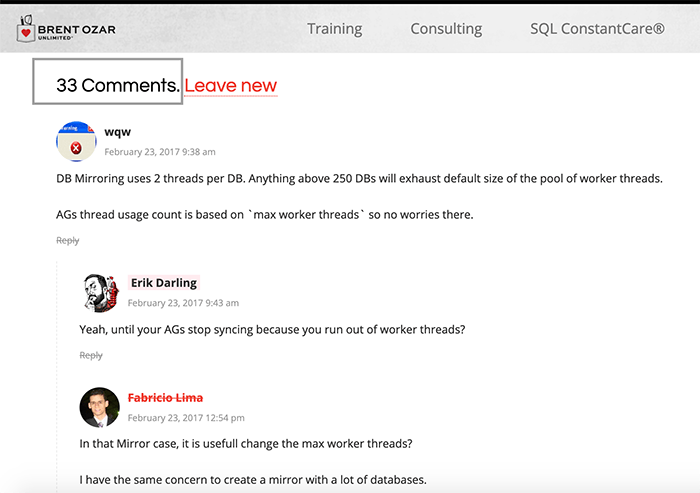
Do comments affect the SEO of your content? Comments are a good thing for any blog since they allow you to engage with your audience. However, they can be time-consuming to moderate depending on how much traffic your blog or website is getting. This article discusses how comments affect SEO and why some people have done away with them altogether.
Comments are like a double-edged sword. They are a great engagement signal, which is good for SEO but can also harm your efforts in certain conditions. This is why some publishers have chosen to disable comments on their sites, while others heavily moderate them.

Are You Ready To Work Your Ass Off to Earn Your Lifestyle?
Are you tired of the daily grind? With a laptop and an internet connection I built a small website to generate income, and my life completely changed. Let me show you exactly how I’ve been doing it for more than 13 years.
Answer: Yes, comments can have a negative or positive effect on your SEO
Seth Godin, a prominent marketing book Author, and Speaker once wrote on his blog explaining why he doesn’t have comments. Basically, the main reasons were because having comments would take a lot of his time and alter the way he writes.
However, that’s just one side of the spectrum since many others argue in favor of having comments. In fact, a case study by Shout Me Loud showed a positive effect on SEO when blog comments are present. Google’s Gary Illyes, a Webmaster Trends Analyst, confirmed comments as being part of the overall quality of a site in the following conversation on Twitter.
@jenstar it feeds into general quality. Say, there’s good content, 5 points, great links from great pages, 2 points, thriving community, 1pt
— Gary “鯨理” Illyes (@methode) April 27, 2016
How Comments Affect The SEO of Your Content
In the SEO community, there’s a clear consensus that comments can impact SEO both positively and negatively. The latter comes from spam, which is certainly an issue that won’t go away anytime soon. The former is closely related to keyword density and engagement, which feeds into your overall PQ (Page Quality).
Comment Spam
Low-quality comments can tank a web page and they usually come from automated spammers. In general, any user-generated content that doesn’t add value to the article or page should be disregarded as spam as well. Comments that are extremely short, contain irrelevant external links, and are not related to the content of your page will harm SEO.
You can set appropriate measures for fighting spammers by getting a spam filter like Anti-Spam for WordPress.
Spammers are more clever than ever and can disguise spam as legitimate comments. However, that isn’t a real concern if you ‘nofollow’ comment links. The nofollow Meta attribute (or rel nofollow tag) is used to tell search engine algorithms not to pass on any ‘link equity’ to specific links. WordPress does this automatically. I’ve actually removed the option to submit a website link and this significantly cuts down time required for comment moderation.
Keyword Density
This is the percentage or number of times your target keyword or phrase appears in your text vs. total word count. Search engines use keyword density to determine a page’s relevance to a given query, though it’s debated what that percentage should be, and how heavily it’s weighted when ranking pages.
Personally? I don’t focus on keyword density, and it’s one of the reasons I don’t use Yoast for SEO.
User-generated content (or UGC) can skew your keyword density in a negative way. This is because more words are added to the page and every new text affects your target keyword ratio. That’s why comments moderation is so important.
Valuable comments will naturally include variants of your target keyword and genuinely add to the discussion. Look for this as you approve or disapprove comments.
Also, you can check your keyword density with a tool like The SEO Real-Time Keyword Density Calculator. One common mistake newbies make when they think of keyword density is to just factor in the article itself. However, that’s not how search engine algorithms see your web page. They factor in every single piece of text on the given page.
To use the tool, simply use CTRL + A (Windows) or Command + A (for Mac) to copy all the text on a page. Manually include any alternative image texts into the provided text space. The tool will automatically calculate density for words and phrases.

Why You Shouldn’t Get Rid Of Your Comment Section
Obviously, for most people, the question or whether or not to remove comments is an easy answer: No way! I mean… comments are a significant ranking signal, right? Even Google has gone on record about the effects of comments on site quality.
Most sites should allow comments because, with moderation, the SEO value seems to outweigh any potential drawbacks.
- Users basically create free content for you
- Added content registers as an update, meaning your content is “fresh”
- It keeps users engaged and returning
- Engaging discussions keep users on your site longer
- It creates more internal linking (and affiliate) opportunities
Plus, in a way, comments are a form of social proof. Additionally, theycan assist authors/publishers with generating content ideas. When you pay attention to comments, you’ll often uncover much-needed insights as to what your audience wants.
Furthermore, comments foster relationship building, which is a huge factor in gaining new subscriptions or customers, increasing your authority over time.
Tips For Encouraging Comments on Your Site

By now it’s obvious that UGC is generally good for SEO but how do you encourage people to leave comments?
This is a challenge for many blogs or sites with amazing content. Sometimes, it can feel like no one cares about your content enough to leave a comment but that isn’t usually the case. Well-research and comprehensive articles rarely get many comments by themselves.
You need to push your readers somehow. So here are some tips that’ll help you get more comments on your website.
- Ask a question but make sure it’s open-ended.
- Create content that entices readers to chime in such as influencer round-ups, expert advice, and top list content.
- Use visuals with your content such as photos and videos.
- Comment on other like-minded blogs or websites with your URL.
- Spark conversations by creating content that is controversial, thought-provoking or heavily opinionated.
- Be active on your site’s comment section by responding to every audience feedback or contribution.
- Share something emotional.
- Give free value that your readers won’t get elsewhere. For example, share something that they would otherwise have to pay to learn.
- Genuinely ask readers to comment and encourage them to do so.
- Create a series of articles and publish them on a consistent schedule.
- Be passionate about what you share.
Me? I hate leaving comments on blogs. I feel like it’s a waste of time and and I hate arguing with people on the internet. I love comments on my blog though. What causes you to comment on a blog, and do you ever return back to see what the responses are?

Nathaniell
What's up ladies and dudes! Great to finally meet you, and I hope you enjoyed this post. My name is Nathaniell and I'm the owner of One More Cup of Coffee. I started my first online business in 2010 promoting computer software and now I help newbies start their own businesses. Sign up for my #1 recommended training course and learn how to start your business for FREE!

 Why Wealthy Affiliate Average Earnings Are Never Discussed
Why Wealthy Affiliate Average Earnings Are Never Discussed
Anon
Intresting post and That was an informative post. Yes, it is not possible to rank number #1 within six months with white HAT SEO activities. SEO is a long-term resulting technique. Using right techniques will take time but will deliver quality results that last long.
Nathaniell
I disagree. It’s very possible to rank well within six months, as long as you are targeting low-competition keywords and writing unique content (not regurgitated).
PX Media
Nice!
I was a bit confused about how much commenting effect for SEO profession. But your article to help me clear all doubts.
tom
thanks for this post
Nathaniell
You’re welcome Tom. I appreciate your comment (and SEO boost lol).
Manoj Sarkar
Hey Nathan!
Awesome article added lots of value to SEO knowledge will sure to bring the points into practice.
Nathaniell
Thanks Manonj! I hope comments are able to help your own SEO and online marketing efforts.
Shiftwave Technologies
Well Said Nathaniell. Awesome post. Thank you for sharing…